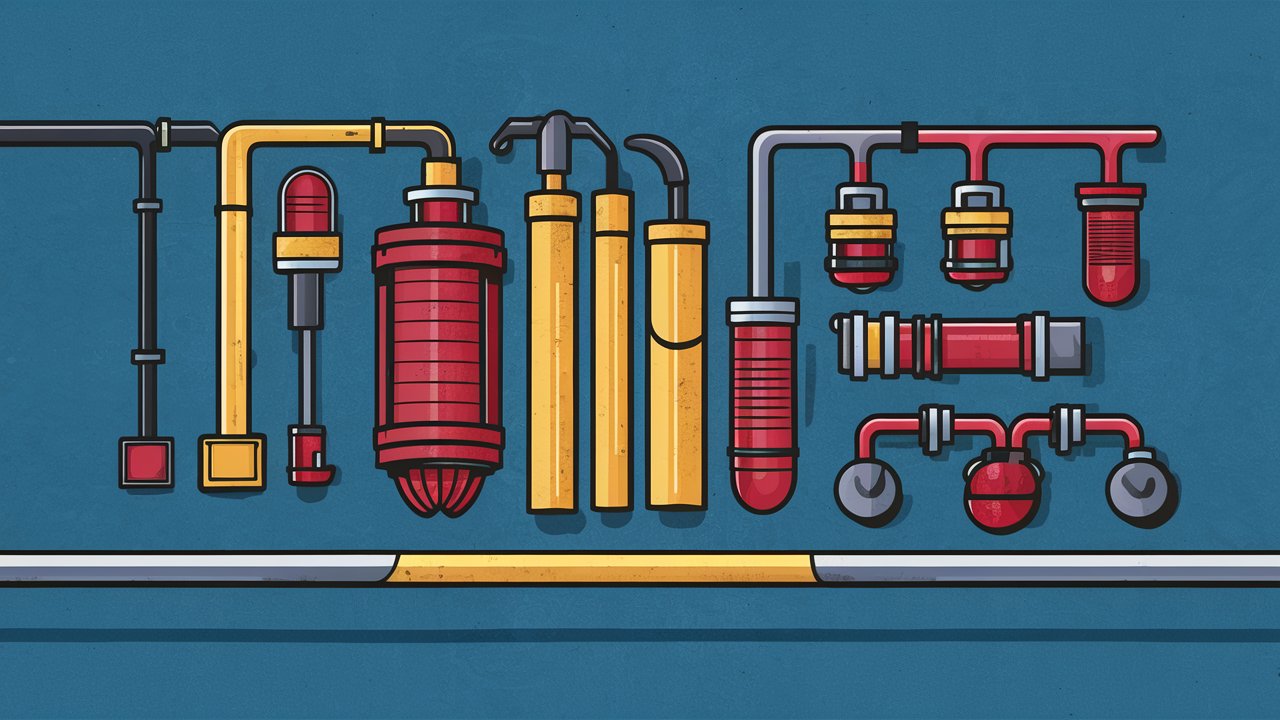When it comes to fire sprinkler systems, selecting the right type of pipe is crucial for ensuring the effectiveness and reliability of the system. The type of pipe used can impact the system’s performance, durability, and maintenance requirements. Various materials are employed in fire sprinkler systems, each offering distinct advantages and suited to different applications based on factors such as fire protection standards, environmental conditions, and cost considerations.
- Steel Pipes
- Black Steel Pipes
- Galvanized Steel Pipes
- Carbon Steel Pipes
- Alloy Steel Pipes
- Copper Pipes
- CPVC Pipes
- Iron Pipes
1. Steel Pipes
Steel pipes are among the most commonly used materials for fire sprinkler systems due to their strength and reliability. They are highly durable and can withstand high pressure, making them suitable for various fire protection applications. Different types of steel pipes are used, each with unique properties that affect their performance and suitability for specific fire sprinkler systems.
a. Black Steel
Black steel pipes are often used in fire sprinkler systems because of their high strength and resistance to high temperatures. These pipes are coated with a layer of black iron oxide to protect against corrosion and are widely utilized for both residential and commercial fire sprinkler systems. Their robust nature makes them ideal for handling the pressures associated with fire suppression systems.
b. Galvanized Steel
Galvanized steel pipes are coated with a layer of zinc to enhance their resistance to corrosion. This makes them suitable for environments where the pipes are exposed to moisture or other corrosive elements. While galvanized steel offers good protection against rust, it is generally less favored for fire sprinkler systems compared to black steel due to the potential for the zinc coating to degrade over time.
c. Carbon Steel
Carbon steel pipes are used in fire sprinkler systems due to their strength and ability to handle high pressures. These pipes are made from a combination of iron and carbon, which gives them their strength and durability. Carbon steel is often used in large-scale fire protection systems where high performance and reliability are required.
d. Alloy Steel
Alloy steel pipes are designed with additional elements like chromium, molybdenum, and nickel to enhance their properties. These additives improve the pipe’s strength, toughness, and resistance to high temperatures and corrosion. Alloy steel is used in specialized fire sprinkler systems where extreme conditions are a factor, providing excellent durability and performance.
2. Copper Pipes
Copper pipes are another option for fire sprinkler systems, known for their corrosion resistance and ease of installation. Copper is highly durable and can handle high temperatures, making it suitable for areas with high fire risk. However, copper pipes are generally more expensive than steel options, which can be a consideration depending on the size and scope of the fire protection system.
3. CPVC Pipes
Chlorinated Polyvinyl Chloride (CPVC) pipes are used in some fire sprinkler systems due to their resistance to corrosion and ease of installation. CPVC pipes are lightweight and offer good fire resistance properties, making them suitable for residential and commercial systems. They are often chosen for their cost-effectiveness and ability to handle both hot and cold water, but they may not be as durable as metal options in high-pressure applications.
4. Iron Pipes
Iron pipes, including cast iron and ductile iron, are used in fire sprinkler systems for their durability and strength. Cast iron has been traditionally used in fire protection due to its ability to withstand high pressures and temperatures. Ductile iron, which is more flexible than cast iron, provides additional strength and resistance to impact, making it suitable for various fire sprinkler applications.
Which Type Of Pipe Is The Best For Fire Sprinkler Systems?
Black steel pipe is the best type of pipe for fire sprinkler systems because it offers a combination of strength, durability, and cost-effectiveness. It is capable of withstanding the pressures and temperatures associated with fire suppression systems while providing reliable performance over time. Black steel pipes are widely used in both residential and commercial fire protection systems, making them a preferred choice among professionals in the industry.


